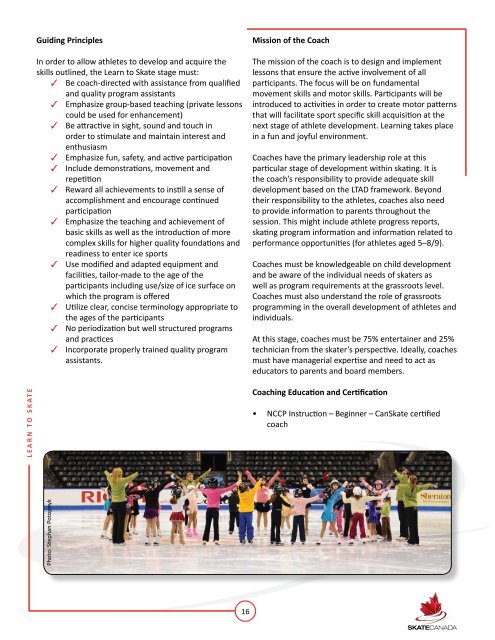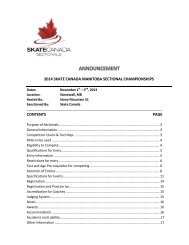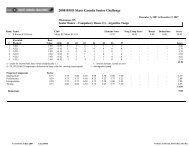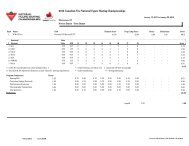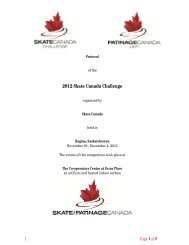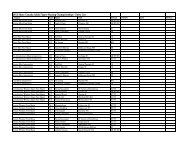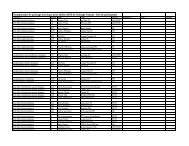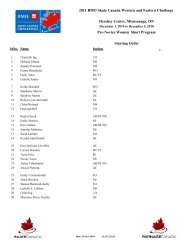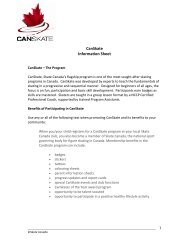LONG-TERM ATHLETE DEVELOPMENT - Skate Canada
LONG-TERM ATHLETE DEVELOPMENT - Skate Canada
LONG-TERM ATHLETE DEVELOPMENT - Skate Canada
Create successful ePaper yourself
Turn your PDF publications into a flip-book with our unique Google optimized e-Paper software.
L E A R N T O S K A T E<br />
Guiding Principles<br />
In order to allow athletes to develop and acquire the<br />
skills outlined, the Learn to <strong>Skate</strong> stage must:<br />
3 Be coach-directed with assistance from qualified<br />
and quality program assistants<br />
3 Emphasize group-based teaching (private lessons<br />
could be used for enhancement)<br />
3 Be attractive in sight, sound and touch in<br />
order to stimulate and maintain interest and<br />
enthusiasm<br />
3 Emphasize fun, safety, and active participation<br />
3 Include demonstrations, movement and<br />
repetition<br />
3 Reward all achievements to instill a sense of<br />
accomplishment and encourage continued<br />
participation<br />
3 Emphasize the teaching and achievement of<br />
basic skills as well as the introduction of more<br />
complex skills for higher quality foundations and<br />
readiness to enter ice sports<br />
3 Use modified and adapted equipment and<br />
facilities, tailor-made to the age of the<br />
participants including use/size of ice surface on<br />
which the program is offered<br />
3 Utilize clear, concise terminology appropriate to<br />
the ages of the participants<br />
3 No periodization but well structured programs<br />
and practices<br />
3 Incorporate properly trained quality program<br />
assistants.<br />
Photo: Stephan Potopnyk<br />
865 Sheord Road, Ottawa, Ontario K1J 1H9<br />
Phone 613.747.1007 I Toll Free 1.888.747.2372 I Fax 613.748.5718 I Toll Free Fax 1.877.211.2372<br />
16<br />
Mission of the Coach<br />
The mission of the coach is to design and implement<br />
lessons that ensure the active involvement of all<br />
participants. The focus will be on fundamental<br />
movement skills and motor skills. Participants will be<br />
introduced to activities in order to create motor patterns<br />
that will facilitate sport specific skill acquisition at the<br />
next stage of athlete development. Learning takes place<br />
in a fun and joyful environment.<br />
Coaches have the primary leadership role at this<br />
particular stage of development within skating. It is<br />
the coach’s responsibility to provide adequate skill<br />
development based on the LTAD framework. Beyond<br />
their responsibility to the athletes, coaches also need<br />
to provide information to parents throughout the<br />
session. This might include athlete progress reports,<br />
skating program information and information related to<br />
performance opportunities (for athletes aged 5–8/9).<br />
Coaches must be knowledgeable on child development<br />
and be aware of the individual needs of skaters as<br />
well as program requirements at the grassroots level.<br />
Coaches must also understand the role of grassroots<br />
programming in the overall development of athletes and<br />
individuals.<br />
At this stage, coaches must be 75% entertainer and 25%<br />
technician from the skater’s perspective. Ideally, coaches<br />
must have managerial expertise and need to act as<br />
educators to parents and board members.<br />
Coaching Education and Certification<br />
• NCCP Instruction – Beginner – Can<strong>Skate</strong> certified<br />
coach


